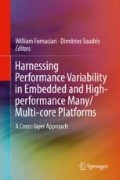Abstract
This chapter presents the proposed event-based thermal control solution at the HARPA-RT level, thus complementing the previous chapter which dealt with the same topic at the HARPA-OS level. A brief analysis of the thermal control problem is presented, evidencing as the main requirement the need for thermal control at the millisecond timescale, caused by software variability in the use of CPU functional resources and fast thermal dynamics inside the silicon die. To meet this requirement while keeping a low overhead, the proposed solution consists of a hardware state machine and datapath that monitors temperature and generates interrupts, and a software policy built using event-based control theory. This partition provides both a fast response to critical and unpredictable temperature increases, a very low overhead when temperature is low or almost constant, and the flexibility of a software implementation of the control policy. The proposed solution is evaluated both in simulation using the Modelica modelling language, and on a commercial Intel CPU.
Access this chapter
Tax calculation will be finalised at checkout
Purchases are for personal use only
References
Casella, F., & Leva, A. (2006). Modelling of thermo-hydraulic power generation processes using Modelica. Mathematical and Computer Modelling of Dynamical Systems, 12(1), 19–33.
Dennard, R., Gaensslen, F., Rideout, V., Bassous, E., & LeBlanc, A. (1974). Design of ion-implanted MOSFET’s with very small physical dimensions. IEEE Journal of Solid-State Circuits, 9(5), 256–268.
Esmaeilzadeh, H., Blem, E., Amant, R. S., Sankaralingam, K., & Burger, D. (2012). Dark silicon and the end of multicore scaling. IEEE Micro, 32, 122–134.
Intel Corporation. Intel optimized LINPACK benchmark. https://software.intel.com/en-us/articles/intel-math-kernel-library-linpack-download
Intel Corporation. Linux thermal daemon. https://01.org/linux-thermal-daemon
Intel 64 and IA-32 Architectures Software Developers Manual. http://www.intel.com/content/www/us/en/architecture-and-technology/64-ia-32-architectures-software-developer-system-programming-manual-325384.html
Leva, A., Terraneo, F., & Fornaciari, W. (2015). Event-based thermal control for high-density processors. In Proceedings of 1st International Conference on Event-based Control, Communication, and Signal Processing, Krakow (pp. 1–8).
Redelmeier, R. The cpuburn CPU stress tester. http://manpages.ubuntu.com/manpages/precise/man1/cpuburn.1.html
Taylor, M. (2013). A landscape of the new dark silicon design regime. IEEE Micro, 33(5), 8–19.
Author information
Authors and Affiliations
Corresponding author
Editor information
Editors and Affiliations
Rights and permissions
Copyright information
© 2019 Springer International Publishing AG, part of Springer Nature
About this chapter
Cite this chapter
Terraneo, F., Leva, A., Fornaciari, W. (2019). Event-Based Thermal Control for High Power Density Microprocessors. In: Fornaciari, W., Soudris, D. (eds) Harnessing Performance Variability in Embedded and High-performance Many/Multi-core Platforms. Springer, Cham. https://doi.org/10.1007/978-3-319-91962-1_5
Download citation
DOI: https://doi.org/10.1007/978-3-319-91962-1_5
Published:
Publisher Name: Springer, Cham
Print ISBN: 978-3-319-91961-4
Online ISBN: 978-3-319-91962-1
eBook Packages: EngineeringEngineering (R0)

